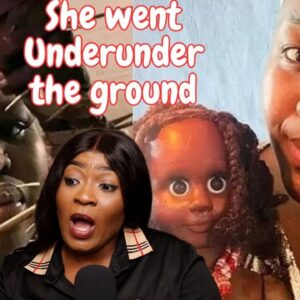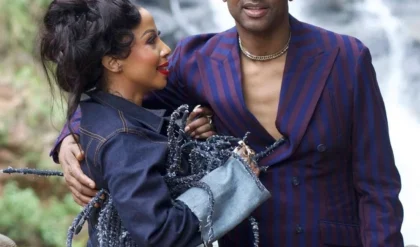In South Africa, a recent legal case has captured the attention of many, sparking debates about faith, accountability, and the power of social media.
Pastor Makuba, a well-known figure in the South African religious community, took legal action against Brother Enigma, a social media commentator, following his public accusations against her ministry. The case, which concluded in favor of Pastor Makuba, has brought to light critical issues about defamation, cyberbullying, and the boundaries of religious discourse in the digital age.
The Origins of the Conflict
The dispute began when Brother Enigma publicly accused Pastor Makuba of being a false prophet, alleging that her ministry’s practices were not aligned with Christian teachings. Among his claims, he specifically targeted the anointing oil sold by her church, describing it as “demonic” and attributing negative outcomes to its use.

For Pastor Makuba, these accusations were not only an attack on her character but also a direct threat to her ministry. She decided to file a lawsuit, arguing that Brother Enigma’s statements were defamatory and intended to tarnish her reputation.
The Legal Outcome
The case, which attracted significant public attention, culminated on December 19, 2004. The court ruled in favor of Pastor Makuba, citing that Brother Enigma’s accusations lacked substantial evidence and amounted to defamation. The ruling also served as a warning against the misuse of social media platforms to spread unverified claims.
Following the court’s decision, Pastor Makuba took to her Facebook page to share her thoughts. In a heartfelt post, she expressed gratitude to God for her victory, emphasizing the importance of holding individuals accountable for their words.

“Once more, He has led us in Christ,” she wrote, referencing 2 Corinthians 2:14. “The lies that are being fabricated against me cannot be tolerated any longer. Breaking the law by slandering the names of innocent Servants of God or anyone cannot be promoted or tolerated.”
Her message also highlighted the growing issue of cyberbullying, particularly its impact on individuals and communities. She called for greater responsibility in the use of social media, stressing that platforms should not be used to harm others for personal gain.
A Divisive Victory
While Pastor Makuba and her followers celebrated the court’s decision, the ruling sparked mixed reactions. Some praised the outcome as a necessary step to protect religious leaders from unwarranted attacks, while others criticized it as an attempt to silence dissent.
Critics argued that Brother Enigma was merely exercising his right to free speech by questioning practices he found questionable. They expressed concerns that the ruling could discourage healthy debate within faith communities, stifling critical conversations about accountability among religious leaders.
Supporters of Pastor Makuba, however, viewed the ruling as a much-needed stand against cyberbullying and defamation. They argued that the spread of false information, particularly about public figures, can have far-reaching consequences, both personally and professionally.
The Broader Implications
This case underscores the challenges posed by social media in contemporary society. Platforms like Facebook and YouTube have given individuals unprecedented access to share their views and reach large audiences. However, the ease of spreading information has also led to an increase in misinformation, defamation, and online harassment.
For religious leaders like Pastor Makuba, social media can be both a blessing and a curse. On the one hand, it allows them to reach and connect with a global audience. On the other hand, it exposes them to intense scrutiny and criticism, often without the safeguards of traditional media.
The ruling in favor of Pastor Makuba serves as a reminder of the legal and ethical responsibilities that come with using social media. While freedom of expression is a fundamental right, it is not without limits. Spreading unverified claims that harm others can lead to serious legal consequences.
A Call for Constructive Dialogue
This case also raises important questions about how faith communities can navigate disagreements constructively. Criticism and accountability are essential in any community, including religious ones. However, it is crucial to approach these conversations with respect, evidence, and a commitment to dialogue rather than division.

Pastor Makuba’s call for greater accountability resonates beyond the context of her legal battle. It highlights the need for individuals to use their platforms responsibly, fostering an environment where differences can be discussed without resorting to personal attacks or defamation.
Looking Ahead
As South Africa continues to grapple with issues of faith, identity, and the role of social media, the case between Pastor Makuba and Brother Enigma serves as a pivotal moment. It challenges individuals to reflect on how they engage with public figures and how they use their platforms to shape public opinion.
For Pastor Makuba, the court’s ruling is not just a personal victory but a statement about the importance of protecting one’s reputation and standing up against false accusations. For Brother Enigma and others in the digital space, it serves as a cautionary tale about the potential consequences of using social media irresponsibly.
Ultimately, this case is a reminder that words have power, both to uplift and to harm. As individuals and communities, we must strive to use that power wisely, fostering an environment of respect, accountability, and understanding.
News
Kelly Khumalo and Arthur Mafokate ‘wedding’: It was new music all along
When images of Arthur Mafokate and Kelly Khumalo started trending on social media a few weeks ago, rumours about a possible romance and a possible marriage between the two musicians spread like wildfire. It was all purely speculative, as no…
‘Mampintsha was never broke’: Babes Wodumo clears the air on lobola claims
‘I can confirm that, as the Simelanes, we received lobola from Mandla and not from Showmax or PAP,’ Babes Wodumo’s manager said. Babes Wodumo and the late Mampintsha. Images: Instagram @viraltrends Award-winning Gqom queen Babes Wodumo has downplayed allegations made…
29-Year-Old Black Entrepreneur Wants to Buy Spirit Airlines to Make it America’s First Black-Owned Commercial Airline
29-year-old entrepreneur Hashim Walters from New Orleans, Louisiana, has officially launched The Latimer Group, an ownership consortium focused on acquiring Spirit Airlines, an iconic brand facing critical financial distress. He says that his mission is to empower African American economic…
What Gogo Maweni Just Did Is So Heart Breaking
The Escalating Drama Between Scoten and Goa: A Deep Dive into a Social Media War In the world of social media, the line between entertainment and personal conflicts often becomes blurred. This is evident in the ongoing drama between two…
SHOCKING 😯 MPUMELELO MSELEKU SHOT AND KIL#ED SOMEONE…||ALLEGEDLY .
The Latest Update on the Controversy Involving Somizi and Mohale In the world of entertainment, the drama surrounding the relationship between Somizi Mhlongo and Mohale Motaung has become one of the most talked-about topics. This couple has consistently been in…
Strange Things About Somizi And Mohale That No One Talks About
Strange Things About Somizi and Mohale’s Relationship That People Never Talk About In the world of South African celebrity gossip, one relationship that has sparked both admiration and speculation is that of Somizi Mhlongo and Mohale Motaung. The two have…
End of content
No more pages to load











